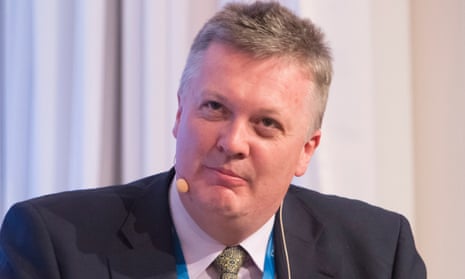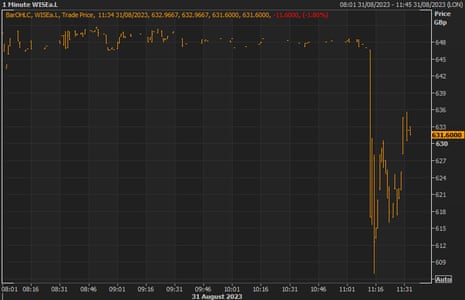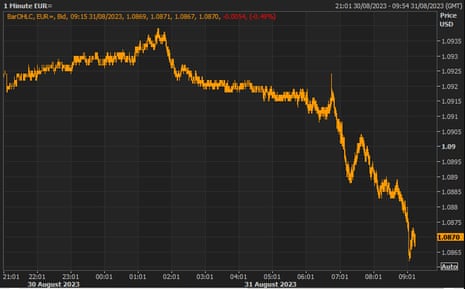Bank of England must ‘see job through’ on cost of living; eurozone inflation higher than expected – as it happened | Inflation
Bank of England must 'see the job through' on inflation says chief economist

The Bank of England needs to keep interest rates high enough for long enough to “see the job through” on cutting inflation, its chief economist has said.
Huw Pill said he was focused on a “lasting return to target” for UK inflation, which was at 6.8% in July, well above the Bank’s 2% target.
The Bank’s monetary policy committee (MPC) has raised interest rates for 14 times in a row, and has another meeting on 21 September. It is expected to raise rates further.
Speaking at a research conference in Cape Town organised by the South African Reserve Bank, Pill said (via Reuters):
The key element is that we on the MPC need to see the job through and ensure a lasting and sustainable return of inflation to the 2% target.
At present, the emphasis is still on ensuring that we are - in the words of the MPC’s last statement - sufficiently restrictive for sufficiently long to ensure that we have that lasting return to target.
Key events
Closing summary: Table Mountain or the Matterhorn
Bank of England chief economist Huw Pill wants a Table Mountain shape to UK interest rates. Pill contrasted higher-for-longer rates with the short, sharp peak of Switzerland’s Matterhorn.
In the US, a quicker turnaround in interest rate policy may be appropriate, given diminishing inflationary pressures, according to the reading of Ian Shepherdson, chief economist at Pantheon Macroeconomics, a consultancy. He said:
The bigger picture here is that it is becoming harder to dismiss the improvement in the inflation numbers as mere noise.
Our base case is that the year-over-year increase in the core PCE will fall to around 3% by the end of the year, setting the stage for rate cuts starting next spring.
But there are still other indicators that could push the Fed to hike further, argues Ryan Brandham, head of global capital markets, North America, at Validus Risk Management, an investment software company. He picked up on weekly jobs data, which came in better than expected. 228,000 new jobs were created, compared to an expected 235,000. He said:
While the US economy may be slowing, the labour market is showing signs of resilience. The Fed will need to determine whether they should take actions to weaken the labour market in order to get inflation down to 2%, or if the recent slowing is enough to feel confident that inflation is under control.
There is data still to come ahead of the September Fed meeting, but this result indicates another hike this year may still be on the cards.
The eurozone inflation upside surprise also offers a problem for central bankers.
Charles Hepworth, investment director, GAM Investments, an asset manager, said:
Just when everyone assumed eurozone inflation was going to continue its downward trajectory, data published today showed the consumer price index remained stuck at 5.3% over the year. Meanwhile, core inflation also stayed at the same level.
This presents somewhat of a problem for the ECB when it meets in two weeks to decide interest rate policy. A 0.25% hike is most likely on the cards after this data print, which will take the deposit facility rate to 4%.
In other business news:
You can continue to follow our live coverage from around the world:
In the UK, Grant Shapps appointed defence secretary as Claire Coutinho takes energy brief in mini-reshuffle
In the US, Hurricane Idalia brings intense flooding to Carolinas as Floridians count the cost
In US politics, Donald Trump is accused of inflating net worth by $2bn in New York civil case
In our coverage of the Russian war on Ukraine, Prigozhin’s ‘right-hand man’ in Wagner buried
Thank you for reading today on the official last day of summer. Join us tomorrow for the sequel: autumn. JJ
Slower inflation is making some people predict the Federal Reserve can engineer the much hoped-for “soft landing”, bringing down inflation while avoiding a recession.
Consumer spending in the US increased in July by 0.8%, but inflation figures came in as expected, picking up only slightly.
Paul Ashworth, chief North America economist at Capital Economics, a consultancy, said:
Despite the apparent strength of real demand, inflationary pressures continued to ease, with both the headline and core PCE [personal consumption expenditure] deflators increasing by 0.2% month-on-month.
Unfavourable base effects pushed core PCE inflation back up to 4.2%, from 4.1%, but the three-month annualised rate slowed to a two-and-a-half year low of 2.8%, from 3.3% the month before. That’s still above the 2% target but, factoring in the coming slowdown in housing inflation, a return to target by mid-2024 is now well within reach.
🇺🇸Soft landing or turbulence? 🛬
✅Spending +0.8% in July
🟢Inflation-adj +0.6%💵Disposable income +0%
🔻Inflation-adj -0.2% (⚠️first decline in 13months)🏦Savings rate 3.5% (-0.8pt)⚠️not sustainable
PCE #inflation
— Gregory Daco (@GregDaco) August 31, 2023
🔼Headline: 3.3% y/y (+0.3pt)
🔼Core: 4.2% y/y (+0.1pt) pic.twitter.com/QyysedSuNi
The core measure of inflation, which strips out more volatile food and energy figures, came in at 4.2%, up from 4.1% in June, the US BEA said.
The Fed is also fond of the core measure because some policymakers believe it gives a better indication of underlying inflationary pressures – the kind of things that central bankers can target, rather than external shocks such as surging energy prices.
The lack of a big negative surprise – such as a stronger rise in inflation – could give the Federal Reserve room to pause its rate hike path.
Fed governor Jerome Powell did not give much away about his plans when he spoke about the path of interest rates last week at the annual central bankers’ summit at Jackson Hole, Wyoming. But interest rate derivatives markets suggest there is a 90% chance that the Fed will not hike at its next meeting on 20 September.
*NB, in the previous post I put the figure for core PCE. Please refresh to see the correction.
US inflation increases slightly in July as expected
US consumer inflation picked up slightly in July, but was exactly as expected, according to the measure that is known to be favoured by the Federal Reserve.
The personal consumption expenditures index rose by 3.3% in the year to July, the US Bureau of Economic Analysis said. That was bang on the consensus expectation from economists polled by Reuters.
*This post has been corrected to include the correct figure.
The take from Reuters is that today’s eurozone data have something for everyone:
Eurozone inflation proved unexpectedly stubborn this month although price pressures for underlying goods eased, providing ammunition for both supporters and opponents of another European Central Bank interest rate hike.
It reported that Robert Holzmann, Austria’s central bank chief and one of the most outspoken conservatives on the rate-setting governing council, told a Reuters conference that he was still leaning towards a hike but did not consider the inflation data a clincher:
I have not made up a decision because I don’t have all the data, but I would not exclude that I would go for a hike. We are not yet at the highest level (for rates); it could be that we do another hike or two.
Ahead of US inflation data, here is some analysis of the figures from the eurozone, which appeared to show inflation remaining stubbornly high.
Bert Colijn, senior economist for the eurozone at ING, a Dutch investment bank, said:
Inflation in the eurozone did not fall in August, which could tip the ECB in favour of a final [0.25 percentage point] hike at the governing council meeting in two weeks’ time. Still, overall inflation dynamics remain relatively benign, and we still expect inflation to trend much lower at the end of the year
Richard Flax, chief investment officer at Moneyfarm, a wealth manager, said:
The battle between the hawks and the doves is likely to heat up ahead of the next ECB decision. Nine straight rate hikes from the ECB have cooled economic growth, and amid concerns over deflationary pressures, markets have begun to price in a possible pause to eurozone rate hikes when the ECB meets in September. However, with inflation data still remaining at elevated levels, we cannot rule out further rate hikes before the year is out.
India’s economy grew at an annual pace of 7.8% in the first quarter of 2023, slightly faster than the 7.7% expected by economists.
It was the fastest growth in a year.
INDIA GDP QUARTERLY (YOY) (Q1) ACTUAL: 7.8% VS 6.1% PREVIOUS; EST 7.8%
— First Squawk (@FirstSquawk) August 31, 2023

An update on those $10bn in cost cuts by UBS after taking over its erstwhile rival, Credit Suisse: the bank will cut 3,000 jobs in Switzerland alone.
That is one in 12 Swiss jobs – a tricky prospect during an election year in the country.
8,000 people have already left Credit Suisse of its own accord, according to Reuters. The name is also due to disappear completely, 167 years after it was founded in 1856.
The Financial Times also has an interesting tidbit about UBS’s results (which the bank put out at the same time as the strategy announcement): UBS technically recorded the biggest profit of all time for a bank, at $29bn (£23bn) for the quarter.
Don’t get too excited though: “its record $29bn pre-tax profit was almost entirely thanks to the accounting gain it recorded on the $3.4bn takeover,” the FT reported. “The previous largest quarterly bank profit was $14.3bn, reported by JP Morgan at the start of 2021.”
Wilko job cuts to begin after last-minute bid fails


Job cuts at Wilko’s head office and warehouses are expected to begin this week after a surprise £90m bid for the discount retailer fell through.
It is understood that about a third of the 1,400 staff at the group’s headquarters and distribution centres are to be made redundant after talks with M2 Capital collapsed because a failure to provide proof of funding.
Talks on a rival bid from the HMV owner, Doug Putman, continue. It is understood that he does not want to hold on to Wilko’s back-office function, only the brand and its stores.
Almost 12,500 jobs are at risk after Wilko called in administrators this month as it ran short of cash.

The UK government has proposed changes to heat pump regulations which it says could make it cheaper and easier for households and small businesses to install the green technology – but there may be a catch.
The proposals could mean varying the levels of grants – £5,000 for an air source heat pump or biomass boiler, or £6,000 for a ground source heat pump – depending on the customer’s property type or existing fuel source. The changes could make heat pumps “more affordable for even more households and small businesses”, the government said.
Heat pumps are seen by most experts as one of the most important technologies for the energy transition, replacing fossil fuels burned in the home with electricity which can gradually be switched to zero emissions sources.
However, the consultation shows that the government is considering ways to actually cut the grants on offer for some households in the future. The consultation said:
It is possible that heat pump costs will fall faster for properties currently with gas heating rather than those with oil heating. If this transpires then it may be appropriate, in future, to reduce the grant value faster for properties replacing gas heating than oil heating.
Other changes mean that houses will not have to meet a higher bar for energy performance (such as requiring proper insulation) to qualify for heat pump subsidies, which a Lords committee had found to be a barrier to installation for some people.
Subsidies could also be available to biomass boilers that can cook as well, under the proposals.
Jess Ralston, an energy analyst at the Energy and Climate Intelligence Unit (ECIU), a thinktank, said it was welcome that the UK government was realising that it is falling behind peers on heat pump installations.
She said:
This move would mean the UK’s levels of support for installing heat pumps becomes more closely aligned to other nations, including lots of EU countries, the US and Australia. The rest of the world has been slowly ramping up heat pump deployment for some time, so much so that there are now 20m installed in Europe and the US sold more heat pumps than gas boilers last year.
Wise shares, listed in London, are down by 1.8% after the sanctions announcement. They had fallen as far as 4% when the initial announcement came out.
You can see the share price move in the below chart. A big drop, followed by a sigh of relief in visual form as investors realised there was no monetary penalty:

Fintech Wise breached sanctions laws on Russia but avoids fine

Fintech firm Wise has broken UK laws on sanctions on Russia by allowing a person under sanctions to withdraw cash, the Treasury has said.
Wise escaped a fine because it was only a £250 withdrawal, and the company reported the breach itself.
The “nature and circumstances of this breach were assessed as moderately severe”, the Treasury’s Office for Financial Sanctions Implementation (OFSI) said in a report. The appropriate penalty was therefore “disclosure” – consider them punished.
The withdrawal was from a business account held with Wise, but was on a card issued in the designated person’s name on 30 June, one day after sanctions were imposed on 29 June.
There were 12 people newly designated for sanctions on 29 June 2022, according to the UK’s sanctions list, among them Russian oligarchs and leaders of the Wagner mercenary group. The person who withdrew the money was not named.
Wise matched the name on a sanctions database, but its policy was not to shut down access to debit cards immediately because of a lot of “false positives”, the Treasury report said. Someone checked the sanctions a day after the withdrawal was made, and it took another three days for the debit card to be blocked.
OFSI said:
Despite the low breach value, OFSI considered that Wise’s systems and controls, specifically its policy surrounding debit card payments, were inappropriate. This factor made the case moderately severe overall and enabled funds to be made available to a company owned or controlled by the designated person.
A Wise spokesperson said:
At Wise, we take the responsibility of complying with all sanctions laws very seriously. We took immediate steps to suspend our services to Russia as soon as sanctions were enacted in response to its invasion of Ukraine.
On June 29, 2022, an individual was added to the list of sanction-designated persons under UK regulations. We promptly followed sanctions screening procedures and suspended an account suspected to belong to a business owned by that individual. This meant that the account-holder could no longer send or receive any funds via this account. During our review of this account, however, we learned that a business debit card associated with the account was used to make a £250 ATM withdrawal on the same day.
We voluntarily reported this ATM withdrawal to OFSI, undertook an immediate review of our processes and implemented the necessary internal system changes to prevent this type of transaction going forward.
We take this matter very seriously. We remain committed to ensuring that our day-to-day operations are in compliance with all relevant regulatory requirements, and to working openly and collaboratively with our regulators.
*This post has been updated to add Wise’s comment.
Bank of England chief economist Huw Pill used some intriguing topographical metaphors in his speech on the UK economy and the path of interest rates.
Bloomberg’s Lucy White reports that Pill said he wanted a “Table Mountain” approach to interest rates – rather than a Matterhorn.
BOE's Huw Pill says he's backing a "Table Mountain" approach for UK interest rates, in one of his clearest hints yet on future path of hikes. Implies further rises limited, but the base rate likely to stay at or near its current 5.25% for some time. https://t.co/29bJx19ZbG pic.twitter.com/akSm1eDOjB
— Lucy White (@LucyGJWhite) August 31, 2023

The speech was in Cape Town, which is overlooked by Table Mountain. A flat top would suggest interest rates will remain at current levels for a long while, rather than dropping steeply like the famous spike of the Matterhorn on the Swiss-Italian border.

(And a thumbs up from the business live blog for visually interesting metaphors in central bank speeches.)

The euro has edged further against the US dollar today after eurozone inflation data beat expectations.
The single currency is trading at $1.087, down 0.5% against the dollar. It peaked above $1.093 earlier this morning.





